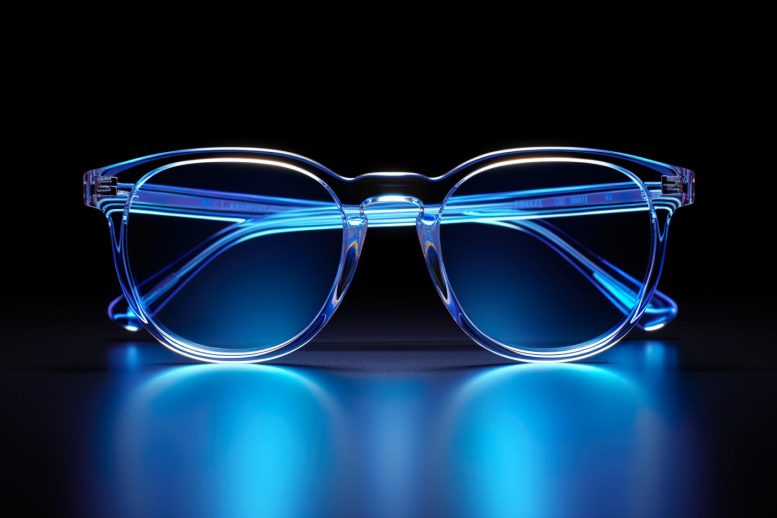
According to a recent Cochrane review, eyeglasses promoted to block blue light likely have no impact on eye strain from computer usage or on sleep quality.
According to a review of 17 randomized controlled trials, glasses marketed to filter out blue light likely don’t alleviate eye strain from computer use or improve sleep quality. Additionally, there was no evidence suggesting that blue-light filtering lenses shield the retina, the light-sensitive layer at the back of the eye, as included studies did not evaluate this outcome.
Since the early 2000s, blue-light-blocking glasses have grown in popularity, frequently suggested or prescribed by optometrists.
The new review, published in the Cochrane Database of Systematic Reviews, was led by researchers at the University of Melbourne in collaboration with colleagues at City, University of London, and Monash University.
The team set out to assess the effects of blue-light filtering lenses compared with non-blue-light filtering lenses for improving visual performance, providing protection to the retina, and improving sleep quality. They analyzed data from all the randomized controlled trials they could find on the topic and found 17 trials from six countries. The number of participants in individual studies ranged from five to 156, and the period of time over which the lenses were assessed ranged from less than one day to five weeks.
The senior author of the review is Associate Professor Laura Downie, Dame Kate Campbell Fellow and Head of the Downie Laboratory: Anterior Eye, Clinical Trials and Research Translation Unit, at the University of Melbourne, Victoria, Australia.
No Proven Benefits for Eye Strain or Sleep Quality
She said: “We found there may be no short-term advantages with using blue-light filtering spectacle lenses to reduce visual fatigue associated with computer use, compared to non-blue-light filtering lenses. It is also currently unclear whether these lenses affect vision quality or sleep-related outcomes, and no conclusions could be drawn about any potential effects on retinal health in the longer term. People should be aware of these findings when deciding whether to purchase these spectacles.”
However, the quality and duration of the studies also need to be considered, she said.
“We performed the systematic review to Cochrane methodological standards to ensure the findings are robust. However, our certainty in the reported findings should be interpreted in the context of the quality of the available evidence. The short follow-up period also affected our ability to consider potential longer-term outcomes.”
The first author of the review, Dr. Sumeer Singh, a postdoctoral research fellow in the Downie Laboratory, said: “High-quality, large clinical research studies with longer follow-up in more diverse populations are still required to ascertain more clearly the potential effects of blue-light filtering spectacle lenses on visual performance, sleep, and eye health. They should examine whether efficacy and safety outcomes vary between different groups of people and using different types of lenses.”
The review did not find any consistent reports of adverse side effects from using blue-light filtering lenses. Any effects tended to be mild, infrequent, and temporary. They included discomfort wearing the spectacles, headaches, and lower mood. These were likely to be related to the wearing of spectacles generally, as similar effects were reported with non-blue-light filtering lenses.
Prof. Downie said: “Over the past few years, there has been substantial debate about whether blue-light filtering spectacle lenses have merit in ophthalmic practice. Research has shown that these lenses are frequently prescribed to patients in many parts of the world, and a range of marketing claims exist about their potential benefits, including that they may reduce eye strain associated with digital device use, improve sleep quality and protect the retina from light-induced damage. The outcomes of our review, based on the current, best available evidence, show that the evidence is inconclusive and uncertain for these claims. Our findings do not support the prescription of blue-light filtering lenses to the general population. These results are relevant to a broad range of stakeholders, including eye care professionals, patients, researchers, and the broader community.”
Do Digital Screens Emit Enough Blue Light to Matter?
The potential mechanisms by which blue-light filtering lenses might be able to help with eye strain, sleep, and protecting the retina are unclear. One basis for claims about the benefits of these lenses is that modern digital devices such as computers and smartphones emit more blue light than traditional lighting sources, and are being used for longer, and closer to bedtime.
Dr. Singh said: “The amount of blue light our eyes receive from artificial sources, such as computer screens, is about a thousandth of what we get from natural daylight. It’s also worth bearing in mind that blue-light filtering lenses typically filter out about 10-25% of blue light, depending on the specific product. Filtering out higher levels of blue light would require the lenses to have an obvious amber tint, which would have a substantial effect on color perception.”
Reference: “Blue-light filtering spectacle lenses for visual performance, sleep, and macular health in adults” by Sumeer Singh, Peter R Keller, Ljoudmila Busija, Patrick McMillan, Eve Makrai, John G Lawrenson, Christopher C Hull and Laura E Downie, 18 August 2023, Cochrane Database of Systematic Reviews.
DOI: 10.1002/14651858.cd013244.pub2
Never miss a breakthrough: Join the SciTechDaily newsletter.